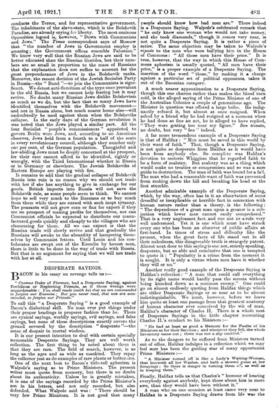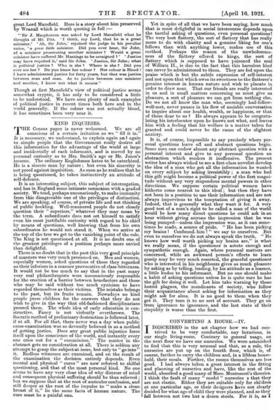" Cosmue Duke of Florence, had a Desperate Saying, against
Perfidious or Neglecting Friends, as if those wrongs were unpardonable : You shall reside (saith he) that we are commanded to forgive our Enemies ; But you never read, that wee are com- manded, to forgive our Friends."
To call this " a Desperate Saying " is a good example of Bacon's dialectical skill. No man ever put things under their proper headings in properer fashion than he. There are cynical sayings, worldly sayings, evil sayings, and false sayings, but .none of these descriptions exactly covers the ground covered by the description " desperate "—the sense of despair in mortal wisdom. It is our present intention to deal with certain specially memorable Desperate Sayings. They are well worth collection. The first thing to be noted about them is that they are rare. The field of search, however, is as long as the ages and as wide as mankind. They repay the collector just as do examples of rare plants or butterflies. One of the next best to Bacon's title-roll aphorism is Walpole's saying as to Prime Ministers. The present writer must quote from memory, but there is no doubt about its authenticity. Unless he is greatly mistaken, it is one of the sayings recorded by the Prime Minister's son in his letters, and not only recorded, but also defended. What Walpole said was : " There should be very few Prime Ministers. It is not good that many people should know how bad men are." There indeed is a Desperate Saying. Walpole's celebrated remark that " he only knew one woman who would not take money, and she took diamonds," though it comes very near, is not quite a Desperate Saying. It is rather a piece of satire. The same objection may be taken to Walpole's riposte to the men who were bullying him in the House of Commons : " All those men have their price." It is true, however, that the way in which this House of Com- mons aphorism is usually quoted, " All men have their price," is a proper example of a Desperate Saying. The insertion of the word " those," by making it a charge against a particular set of political opponents, takes it out of the Baconian category.
A much nearer approximation to a Desperate Saying, though this one charms rather than makes the blood turn cold, is the alleged saying of the Prime Minister of one of the Australian Colonies a couple of generations ago. The Minister in question was offered a large bribe. He indig- nantly refused it, but almost at once resigned. When asked by a friend why he had resigned at a moment when he had done so fine an act, he is alleged to have replied, " They were getting too near my figure." Ben trovato, no doubt, but very " ben " indeed.
A far more tremendous example of a Desperate Saying is that of Halifax : " Men must be saved in this world by their want of faith." That, though a Desperate Saying, is not quite so desperate from Halifax as it would have been from anybody else. So complete was Halifax's devotion to esoteric Whiggism that he regarded faith to be a form of zealotry. But zealotry was as a thing which would make no treaties or compromises and so was a sure guide to destruction. The man of faith was bound for a fall. The man who had a reasonable want of faith was prevented from rushing down the hill and breaking his head at the first stumble.
Another admirable example of the Desperate Saying, which, by the way, often has in it an obsereation of some dreadful or inexplicable or horrible fact in connexion with human nature rather than a theory, is the following : " The dependence of a great man upon a greater is a sub- jection which lower men cannot easily comprehend." That is a very unpleasant fact, and one not es a rule, very well understood. Yet it is one which must have struck every one who has been an observer of public affairs at first-hand. In times of stress and difficulty like the present, when the great facts of life stand out in all their nakedness, this disagreeable truth is strangely patent. Almost next door to this saying is one not, strictly speaking, desperate, but so able and conclusive that one is tempted to quote it : " Popularity is a crime from the moment it is sought. It is only a virtue where men have it whether they will or no."
Another really good example of the Desperate Saying is Halifax's reflection : " A man that could call everything by its right name would hardly pass the streets without being knocked down as a common enemy." One could go on almost endlessly quoting from Halifax things which are either Desperate Sayings or so near as to be almost indistinguishable. We must, however, before we leave him quote at least one passage from that greatest anatomy of human character ever conceived by the wit of man, Halifax's character of Charles II. There is a whole nest of Desperate Sayings in the little chapter recounting Charles II.'a conduct to his Ministers :— " He had at least as good a Memory for the Faults of his Ministers as for their Services ; and whenever they fell, the whole Inventory came out ; there was not a slip omitted."
As to the dangers to be suffered from Ministers turned out of office, Halifax indulges in a reflection which we may feel sure has been the guiding star of many opportunist Prime Ministers :— " A Minister turned off is like a Lady's Waiting-Woman, that knoweth all her Washes, and bath a shrewd guess at her Strayings : So there is danger in turning them afx.„ as well as in keeping them."
Finally, Halifax tells us that Charles's " humour of hearing everybody against anybody, kept those about him in more awe, than they would have been without it." A man who on one occasion at least came very near to Halifax in a Desperate Saying drawn from life was the great Lord Mansfield. Here is a story about him preserved by Wraxall which is worth quoting m full :— " Sir J. Macpherson was asked by Lord Mansfield what he thought of Mr. Pitt. I think, my Lord, that he is a great minister.' Ah, Sir John,' rejoined the judge in his peculiar voice, ' a great /ittis minister. Did you ever hear, Sir John, of a minister prosecuting another minister ? Would a great minister have suffered Mr. Hastings to be arraigned ? " Justice may have required it,' said Sir John. Justice, Sir John; What is political justice ? Who is she 2 Where is she'? Did you ever see her 7 Do you know her colour ? Her colour is Blood ! I have administered justice for forty years, but that was justice between man and man. As to justice between one minister and another, I know not what it means."
Though at first Mansfield's view of political justice seems somewhat cryptic, it has only to be considered a little to be understood. We have seen plenty of such examples of political justice in recent times both here and in the world generally. If the colour was not actually blood, it has sometimes been very near it.



































 Previous page
Previous page